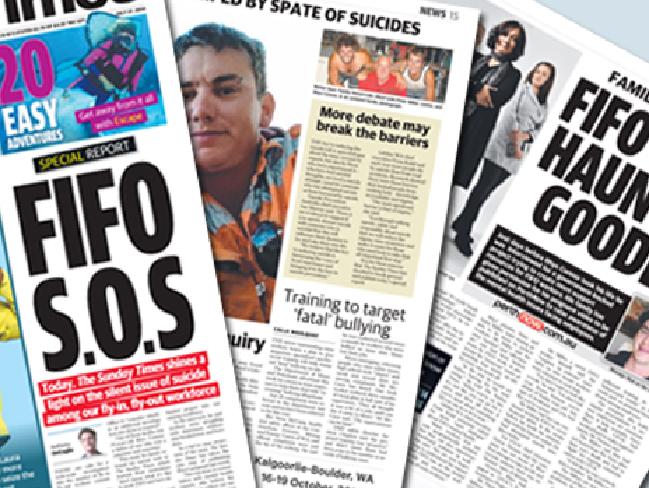Enquiry into the impact of FIFO on mental health

With thanks to Perth Now for the image
A new enquiry into the impact of FIFO on mental health has recommended that a new Code of Practice be created to protect FIFO workers from mental distress. And reading it has made me a bit cross.
Firstly, I DO think it is a good thing that this issue is being looked at, particularly in a country such as Australia where there are a significant number of FIFO or DIDO workers. It can only be a good thing to shine more attention and resources and assistance onto mental health.
The enquiry was initiated as a result of community concerns that 9 FIFO workers had suicided in a 12 month period. Whilst the enquiry could not identify the nine cases in question, their research found that the FIFO demographic profile was at greater risk of mental health problems (including suicide), when compared to the general population.
Report recommendations on proposed Code of Practice
The report, published in June 2015, made the following recommendations on the proposed Code of Practice:
The proposed Code of Practice on FIFO work arrangements would address those challenges and should include the following issues:
- Rosters: encouraging even?time rosters, and rosters that support mental health and wellbeing such as two weeks on, one week off, or the 8 days on, 6 days off roster. Rosters of greater compression than this can result in fatigue and pose significant risks to workers’ mental health and wellbeing, and should be reduced.;
- Fatigue: including an explicit acknowledgement of the impact of fatigue on mental health;
- Workplace culture: through addressing mental health literacy and stigma;
- Bullying: the development of improved anti?bullying procedures and greater capacity for DMP to pursue and prosecute bullying claims;
- Acknowledging the impact of FIFO on personal relationships, including financial pressures and employment volatility, and their impact on personal relationships;
- Communication facilities: the Code should emphasise the need for high quality, reliable and accessible communications technology in FIFO accommodation villages, in order to facilitate worker communication with home;
- Accommodation facilities: including recreational facilities and accommodation practices. The use of ‘motelling’ practices should be minimised, and where possible, abolished; and
- The levels of control exercised over workers within accommodation facilities.
Some interesting comments in the report include the following observations:
Given the realities of life, where bereavement, relationship loss, financial pressure and job loss occur to almost everyone, the Committee considers the issue is less whether a particular workforce is more vulnerable and should therefore receive assistance, and more that every workforce should be seen as vulnerable and requiring assistance.
Industry peak bodies have acknowledged that there are ‘challenges’ to working a FIFO role. Arguments have been made that some individuals are more suited to FIFO work arrangements than others. The Committee does not accept this suitability argument. If this argument is accepted as valid, it suggests that the solution to the ‘challenges’ posed by FIFO work practices is to screen for and recruit only those deemed suitable to handle those challenges. In the Committee’s view, this logic is akin to saying that the solution to the challenge of working safely at heights is to employ only those with exceptional balance, rather than addressing safety risks by providing harnesses and safety railings. Rather than trying to screen for and recruit workers able to withstand the challenges of a FIFO role, industry’s emphasis should be on tailoring FIFO roles to accommodate the mental health needs of workers.
As I said above, I think it is great that this is being looked at. And that it seems to be being taken seriously.
What I do struggle with though and why this has made me more than a little cross, is how any of this can be a surprise to anyone.
- The impact of both shiftwork and fatigue on mental health has been studied and is well documented over many decades.
- There has been decades of research into the impact of specific rosters; and how some are better than others.
- And surely it is no surprise that FIFO workers may feel more isolated (literally through their geographical distance from family and friends) but also figuratively. There are many examples given of FIFO workers not being able to contact family and friends because of either shift regimes and/or technological constraints that make communication patchy at best. Again, the impact of isolation (particularly in males) has been well studied over the years.
- Bullying in workplace culture (umm- the armed forces anyone??)
The report did acknowledge that there were some good programmes already in place, and there is certainly more and more being done both within organisations and through community and other support groups (such as FIFO Families).
And of course, organisations are in it to make dollars. They are ultimately there to serve their shareholders who demand healthy dividends and who don’t always care at what cost those dividends come. And of course, there are operational and geographical constraints.
But surely, in this day and age, with all that we know, we can do better than this?
What do you think? Do you have experience with FIFO work? Is the enquiry a reasonable approach into a difficult problem?
Until next week, happy reading!

